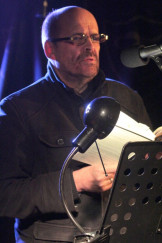Shall I compare thee to a selfie stick? Dos and don'ts of first-person poetry

Can a poem be considered as a selfie stick? And how much “I” should there be in poetry? These were a couple of key questions considered by poets Fiona Sampson, Tim Liardet, RA Villanueva, and Fiona Moore at the Troubadour in London on Monday night in an absorbing and revealing discussion that followed their readings.
The questions were posed and expanded upon by Coffee-House Poetry’s CL Dallat, who described the selfie stick analogy as “our schtick for the evening”. Fiona Sampson, pictured below, who edits Poem magazine, is a former editor of Poetry Review, and currently professor of poetry at Roehampton University, began to address the question by saying during her reading that “in my poetry I’m always trying to get beyond myself”.
In the panel discussion that followed she told the audience that poetry allowed you to talk about “really bad things that have happened to you, yet nobody thinks that it’s true”. But some of the subjects of her poems, including moments of violence, really had been true. She insisted that her poetry was not written with the aim of being therapeutic. However, “life seems to me random, chaotic, and often not very nice. To stay sane, we have to find pattern and ideally a kind of beauty along the way … that’s how we bear it.”
Fiona Moore, who is assistant editor with the poetry magazine The Rialto, and writes a blog called Displacement, said you have to become “impersonal, to write about the personal well”. She also talked of “a certain embarrassment mixed with scepticism about people who write poems that apparently mine their personal experience”. A few in the audience may have shifted uneasily in their seats at this comment. Was writing from personal experience not allowed, or certainly frowned upon, then?
Poet and BBC Radio 4 critic CL Dallat addressed one of his questions directly to Tim Liardet, pictgured below, whose latest collection, The World Before Snow (Carcanet) contains a number of poems with ‘Self-Portrait …’ in the title. Liardet, who is professor of poetry at Bath Spa University, was asked if his succession of self-portraits represented a way of “dressing up”. He replied that the self-portraits were “a way of exploring the deconstruction and reconstruction of self”. He conceded that “I’m in all these self-portraits, in some shape or form”. American poet RA Villanueva said: “Poetry is lies that help us get to some kind of truth.” He added that “in the process of making sense of something, you invent something else … the notion that you can recall something that happened even a second ago is a delusion – and a hope”.

Villanueva agreed that persona poems could represent an act of intrusion, but also suggested that there was value in trying to “capture people who think their stories don’t matter”. He added that “my parents were always nervous about being in my poems”. Liardet concluded by saying that “the self in poetry is unavoidable”. He added that poetry was “self-indulgence”, and that there wouldn’t be any point in it if it wasn’t. Sampson said: “The self is such a vast and foggy question.” Villanueva was passionate in his summing up: “It’s narcissistic, and perilous, and joyous at the same time.” The lively discussion included statements and challenging questions from the floor.
RA (Ron) Villanueva, born in New Jersey, began the readings in the first half of the evening, delivering his poems with exuberant emphasis. They included ‘Swarm’, a tale of a class misdemeanour during biology at a Catholic school involving a phallus and a crucifix – he later revealed that he had donated a copy of the book containing these revelations to his old school, and another about exploring the Mariana trench, the deepest place in the world’s oceans: “We passed the basement of twilight hours ago.”
Fiona Moore read from her pamphlet, Night Letter (Happenstance) which includes a number of moving poems to or about her deceased partner. The title poem begins by saying: “I don’t believe in an afterlife/ any more than you did”, but goes on: “I lie awake/ and can’t not imagine you/ floating, out there/ somewhere between angel and ectoplasm”. It ends with an apology: “if you’re out there, please/ forgive me for imagining/ you, out there.”
Tim Liardet’s poems, from a collection that was shortlisted for the TS Eliot Prize, included one about a wolf-boy, another featuring the hiss and rattle of sleet, and this one, ‘Self-Portrait with Aquarium Octopus Flashing a Mirror’. He had come across the octopus in Barcelona, and taken a film of it on his iPhone, its head “clumsily bashing glass/ like a blunt-nosed angel’s, a throb of plasma.”
Fiona Sampson read poems from her new collection, The Catch, including ‘At Bleddfa’, which she described as a “past selfie”, ‘Neighbours’- “a future me”, and ‘Stone House’, part of a sequence called ‘A Path between the Trees’. Her poetry is spare, the lines short, with no punctuation until the final full stop, making the lines somewhat difficult to quote in isolation. She finished with Dante’s Cave' – “Finally I came/ to the end of the world” – which concludes: “I saw the end is air/ and falling it is clean/ and lovely it is blue.”
Greg Freeman
Top photograph, left to right: CL Dallat, Fiona Moore, Fiona Sampson, RA Villanueva, Tim LIardet








Laura Taylor
Fri 12th Feb 2016 12:25
Hi Joan
You're welcome. Be my guest :)
If those poems are demanding that loudly to be heard, I think you'd better let them! ;)